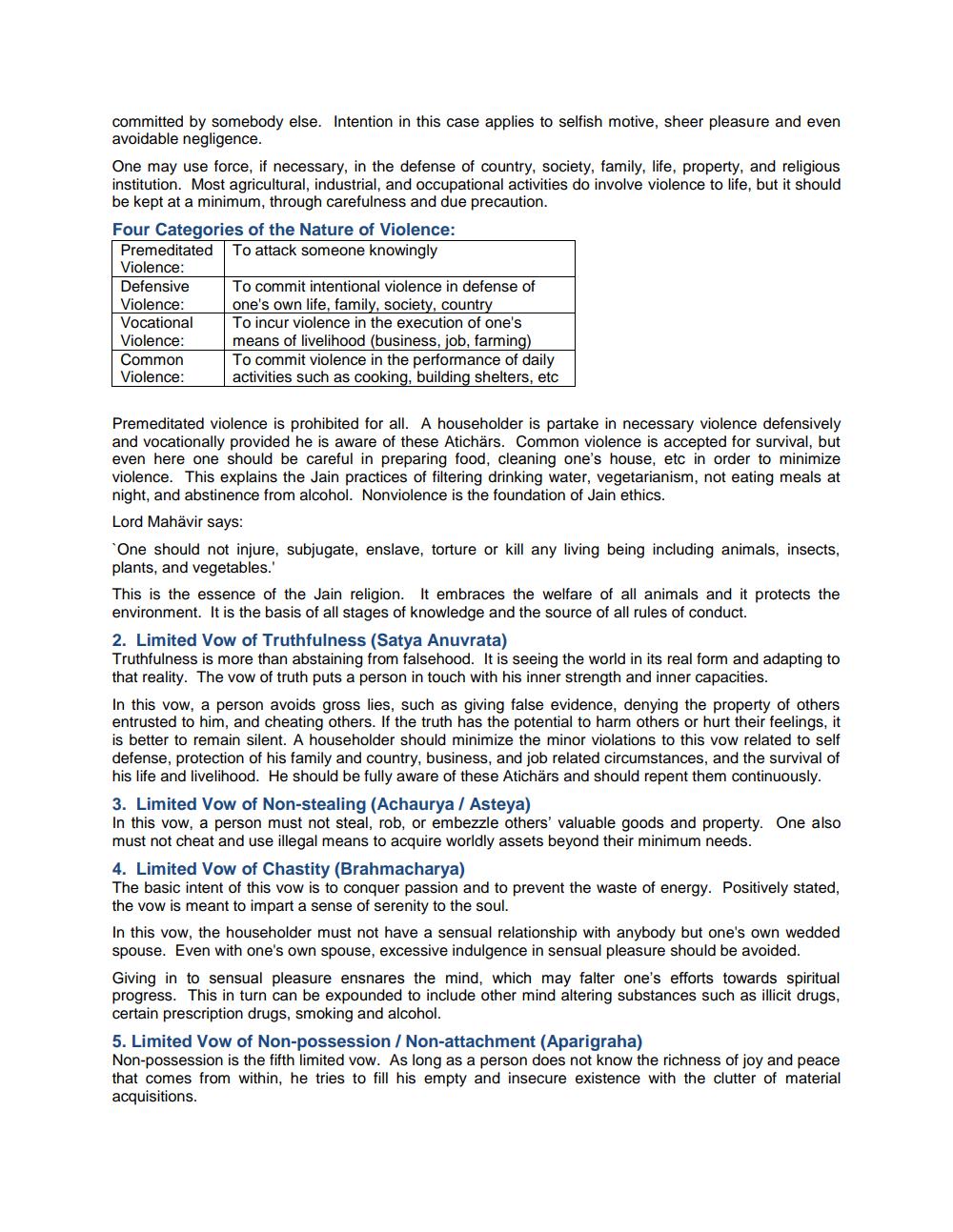Book Title: Twelve Vows of Lay People Author(s): Pravin K Shah Publisher: JAINA Education Committee View full book textPage 2
________________ committed by somebody else. Intention in this case applies to selfish motive, sheer pleasure and even avoidable negligence. One may use force, if necessary, in the defense of country, society, family, life, property, and religious institution. Most agricultural, industrial, and occupational activities do involve violence to life, but it should be kept at a minimum, through carefulness and due precaution. Four Categories of the Nature of Violence: Premeditated To attack someone knowingly Violence: Defensive Violence: Vocational Violence: Common Violence: To commit intentional violence in defense of one's own life, family, society, country To incur violence in the execution of one's means of livelihood (business, job, farming) To commit violence in the performance of daily activities such as cooking, building shelters, etc Premeditated violence is prohibited for all. A householder is partake in necessary violence defensively and vocationally provided he is aware of these Atichärs. Common violence is accepted for survival, but even here one should be careful in preparing food, cleaning one's house, etc in order to minimize violence. This explains the Jain practices of filtering drinking water, vegetarianism, not eating meals at night, and abstinence from alcohol. Nonviolence is the foundation of Jain ethics. Lord Mahävir says: One should not injure, subjugate, enslave, torture or kill any living being including animals, insects, plants, and vegetables.' This is the essence of the Jain religion. It embraces the welfare of all animals and it protects the environment. It is the basis of all stages of knowledge and the source of all rules of conduct. 2. Limited Vow of Truthfulness (Satya Anuvrata) Truthfulness is more than abstaining from falsehood. It is seeing the world in its real form and adapting to that reality. The vow of truth puts a person in touch with his inner strength and inner capacities. In this vow, a person avoids gross lies, such as giving false evidence, denying the property of others entrusted to him, and cheating others. If the truth has the potential to harm others or hurt their feelings, it is better to remain silent. A householder should minimize the minor violations to this vow related to self defense, protection of his family and country, business, and job related circumstances, and the survival of his life and livelihood. He should be fully aware of these Atichärs and should repent them continuously. 3. Limited Vow of Non-stealing (Achaurya / Asteya) In this vow, a person must not steal, rob, or embezzle others' valuable goods and property. One also must not cheat and use illegal means to acquire worldly assets beyond their minimum needs. 4. Limited Vow of Chastity (Brahmacharya) The basic intent of this vow is to conquer passion and to prevent the waste of energy. Positively stated, the vow is meant to impart a sense of serenity to the soul. In this vow, the householder must not have a sensual relationship with anybody but one's own wedded spouse. Even with one's own spouse, excessive indulgence in sensual pleasure should be avoided. Giving in to sensual pleasure ensnares the mind, which may falter one's efforts towards spiritual progress. This in turn can be expounded to include other mind altering substances such as illicit drugs, certain prescription drugs, smoking and alcohol. 5. Limited Vow of Non-possession / Non-attachment (Aparigraha) Non-possession is the fifth limited vow. As long as a person does not know the richness of joy and peace that comes from within, he tries to fill his empty and insecure existence with the clutter of material acquisitions.Page Navigation
1 2 3 4
